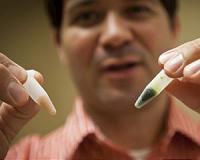 |
Canberra, Australia (SPX) May 26, 2011 Establishing an economically and environmentally beneficial, 'bio-derived' Australian and New Zealand aviation fuels industry is a viable proposition, according to a report compiled by CSIRO in collaboration with the region's major aviation industry players. 25 May 2011 The report, Flight Path to Sustainable Aviation, predicts that over the next 20 years a new, sustainable, Australia-New Zealand aviation fuels industry could cut greenhouse gas emissions by 17 per cent, generate more than 12,000 jobs and reduce Australia's reliance on aviation fuel imports by $2 billion per annum. "This study highlights promising options for the aviation industry," said the project's leader, CSIRO Energy Transformed Flagship's economist Paul Graham. "It also identifies the market, infrastructure and governance changes that will be required for success. "Through the uptake of sustainable bio-derived jet fuel, together with next generation aircraft and engines, the industry can reduce both its emissions and its reliance on imported fossil fuel." The study was commissioned by and developed in collaboration with the members of the Sustainable Aviation Fuel Users Group- including Air New Zealand, Boeing, Qantas and Virgin Australia - together with the Defence Science and Technology Organisation (DSTO) and The Climate Group. It found that production of commercially viable quantities of aviation fuels derived from non-food biomass sources (eg: crop stubble, forestry residues, municipal waste and algae) is a feasible option for Australia and New Zealand. It also found there are currently sufficient biomass stocks to support a local jet fuel industry. Sustainable bio-derived jet fuel complies with social, environmental and economic criteria, which includes not impacting on food security or the environment and results in a reduction in greenhouse gas emissions. The report identifies several major actions that are required by 2015 to ensure the industry can be established. These include: + Creation of a supportive market structure and supply chain + Development of refining plants + Certification and independent verification to ensure sustainability of the fuel. The participants will use the findings of the report as the basis for developing implementation plans and projects, details of which will be announced in the coming months. Some related projects are already in place. Other participants in the study include: Airbus, Australian Defence Force, Brisbane Airport Corporation, Bioenergy Association of New Zealand, Biofuels Association of Australia, GE, Honeywell UOP, New South Wales Office of Biofuels, NSW Office of Trade, Business and Industry, Pratt and Whitney, Queensland Department of Employment, Economic Development and Innovation, Rolls-Royce, Royal Aeronautical Society Australian Division, South Australian Department of Premier and Cabinet, The Climate Group and Victorian Department of Innovation, and Regional Development. The project also engaged international organisations such as the Roundtable on Sustainable Biofuels.
Share This Article With Planet Earth
Related Links Energy Transformed Flagship Bio Fuel Technology and Application News
 Teaching algae to make fuel
Teaching algae to make fuelBoston MA (SPX) May 26, 2011 Many kinds of algae and cyanobacteria, common water-dwelling microorganisms, are capable of using energy from sunlight to split water molecules and release hydrogen, which holds promise as a clean and carbon-free fuel for the future. One reason this approach hasn't yet been harnessed for fuel production is that under ordinary circumstances, hydrogen production takes a back seat to the production ... read more |
|
| The content herein, unless otherwise known to be public domain, are Copyright 1995-2010 - SpaceDaily. AFP and UPI Wire Stories are copyright Agence France-Presse and United Press International. ESA Portal Reports are copyright European Space Agency. All NASA sourced material is public domain. Additional copyrights may apply in whole or part to other bona fide parties. Advertising does not imply endorsement,agreement or approval of any opinions, statements or information provided by SpaceDaily on any Web page published or hosted by SpaceDaily. Privacy Statement |